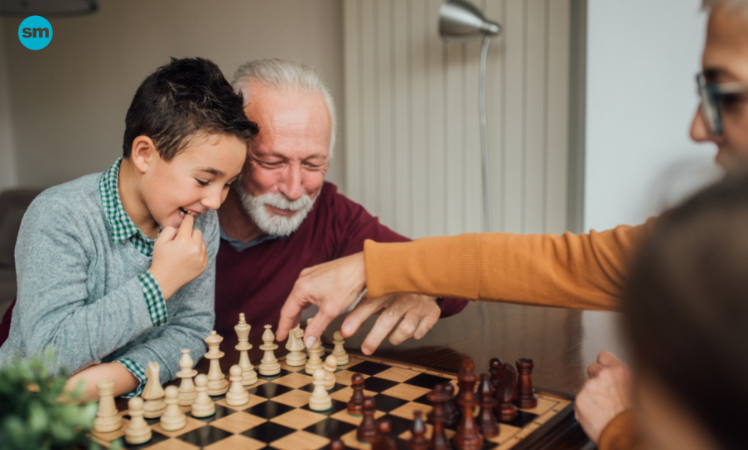7 Tactics of Narcissistic Grandparents You Should Know

Last Updated on May 7, 2024 by Kathy
You think of grandparents as loving, caring people who love their grandchildren. Grandparents suffering from narcissistic personality disorder are quite different. They manipulate their grandchildren to control their family, weaken their children’s parental authority and groom them.
It can be very disruptive for the family dynamic when narcissistic grandparents manipulate their grandchildren. If parents want to protect their children from narcissistic grandparents, they need to be able to comprehend these tactics and understand the reasons.
Triangulation Tactics of Narcissistic Grandparents
Triangulation is a manipulative tactic that can be very harmful. It involves telling one family member one thing, and another something entirely different. This technique is used by narcissistic grandparents frequently between their grandchildren as well as between their grandchildren.
This means that narcissistic grandparents may tell their grandchild one thing, and another one something else. They may also tell their grandchild one thing and their child’s parents another. This manipulative tactic can cause family members to distrust each other and is extremely damaging. Sometimes the damage can last a lifetime.
Playing Favorites
Narcissistic grandparents may also choose to pick one grandchild as their favorite. They will lavish love on this child while neglecting or devaluing the other grandchildren. This tactic is used to get their attention from the other grandchildren. They feel valued and loved. It also creates drama in the family that narcissists love. It can also cause irreparable harm to siblings, as it can lead to rifts between them that will never heal.
Exploiting Vulnerabilities Tactics of Narcissistic Grandparents
Narcissists excel at spotting vulnerability. They can spot what makes someone feel anxious or emotionally distressed.
They will see what makes people uncomfortable and use it to their advantage. Narcissistic grandparents find children easy targets because they are often very open with their emotions. Their narcissistic grandparents won’t hesitate to exploit their weaknesses because they are not mature enough for manipulation.
Filling a Need
Narcissists can be very convincing in presenting themselves as caring people who are willing to help. They often reveal their motivations later on in a relationship.
Narcissistic grandparents often see their grandchildren as having a need that is not obvious. A grandparent who is narcissistic can be a good friend or emotional support for their grandchildren, and may even offer them a way to help them get through difficult times. Sometimes they appear to be on the side of the child, but this is not true. Narcissists only have their own interests.
Subtle Isolation Tactics of Narcissistic Grandparents
Like all narcissists they try to isolate their victims. This is because they don’t want others to see the emotional abuse they are suffering. If a victim of a narcissist has no one to talk to, they will often believe what they are being told.
The same holds true for grandchildren of narcissists. They will be subtly manipulated by their toxic grandparents to try to isolate them and make it difficult for them to talk to other people.
Gaslighting
Gaslighting, a tactic used by narcissists to make victims believe they are crazy, is a well-known technique. The tactic is actually a result of a movie in which a narcissistic husband tried to convince his wife that she was crazy. This is exactly what narcissists want to make you believe.
This rule applies to all grandchildren of narcissists. Gaslighting is a common occurrence among grandchildren of narcissists. Narcissists will often deny the victim’s story outright or make it appear that they are too sensitive or took the wrong path. This tactic can be very damaging to their grandchildren’s self-confidence and can even last a lifetime.
Buying Loyalty Tactics of Narcissistic Grandparents
Narcissistic grandparents also often buy the loyalty of their grandchildren. This is often done despite objections from their children. They will give their grandkids the most expensive gift that the parents won’t or can’t afford. This tactic is used to build a special relationship between their grandchildren and themselves.
They not only get their grandchildren loyal, but it also weakens your parental authority. For example, narcissistic grandparents may buy their children gifts they don’t want. Even if you tell them why they don’t want it, they will often ignore your wishes.
How Can You Protect Your Children from Narcissistic Grandparents?
You want to protect your grandchildren’s self-esteem and self-confidence if you are aware that their grandparents may be narcissistic. It is also important to maintain their relationships with their siblings. Narcissistic grandparents can cause irreparable harm to their self-esteem and self-confidence.
You can prevent the harm done by narcissistic grandparents by doing several things. These are the top ways to protect your kids.
Set Strong Boundaries
Be clear about what acceptable behavior is. They should be informed about the consequences for breaking these boundaries. The consequences should include the possibility that they will be cut off from contact. Even if you don’t feel capable of doing that, it is a good idea to consider this possibility.
Monitored Grandparent Visits
You have the right to exercise your parental rights and monitor your parents’ interactions with your children. This allows you to intervene if your parents do something that you don’t like.
Limited Visits
Limiting the time your children spend with their grandparents can also help to limit their exposure to them. As a parent, you have the right to limit how much time your parents spend with your child. You can limit the time that your parents spend with your children so they don’t do as much damage as narcissists would like. You can also control when your parents are allowed to visit with your grandchildren.
Subjects and Activities with Off-Limits
You have the right to limit what you and your parents can discuss with your children. It’s best to supervise their visits in order to ensure that they do not violate these boundaries.









